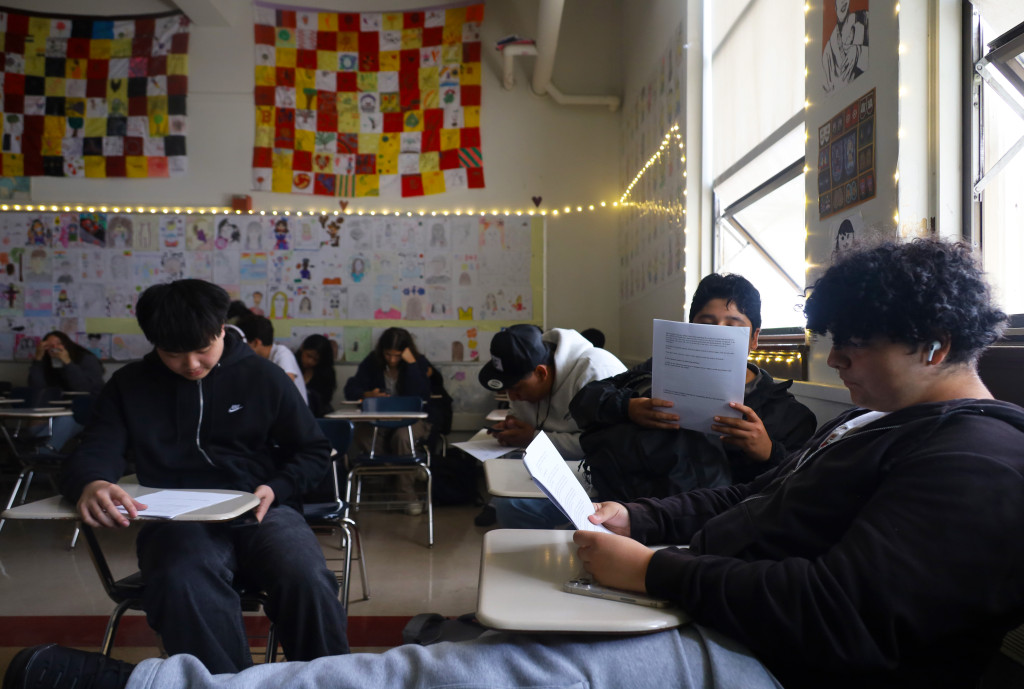“Classes like this allow students to learn history through an entirely different perspective and hopefully grow their empathy for many different groups of people,” Rafael Piedra, a Berkeley High School teacher, said when discussing his Latinx History class — also known as Chicano History. BHS is lucky to be able to have two Latinx studies classes — Latinx History and Latinx Literature. Both classes focus on the experiences of those in Latinx community, specifically by tying them back to major historical events and literary pieces.
In Latinx History, students focus mainly on the experience of the Latinx community in the U.S. According to Piedra, the class covers topics from the colonization of Latin America to the Chicano movement in the 1960s, as well as current events.
“Latino literature has a focus on Latino authors or authors of various countries,” Xochitl Dueñas, the Latinx Literature teacher at BHS, said while explaining the main difference between a regular English class and her Latinx Literature class. Dueñas said she’s had a lot of fun teaching this class, as it creates a community that she always wanted as a kid but found difficult to find. “I never experienced this when I was a kid, of having a space where I looked around and most of the kids in my class looked like me,” Dueñas said, “And also had similar experiences from me and ... an entire year focused on literature from people that I have an affinity for.”
The Latinx studies classes have created a community. “The community is pretty big, and there’s a lot of people that I didn’t know that share the same roots as me,” Yamileth Ortega Munoz, a BHS senior, said as she shared how the community of the Latinx Literature class is something she hadn’t experienced before. Ortega Munoz explained that she took the class to be closer to her roots and found a community of people that had similar experiences to her.
“Chicano history feels like it’s for the sake of knowledge and learning, rather than a test or exam,” Emilio Bottrell-Rogers, a BHS junior, said on Piedra’s Latinx History class. Bottrell-Rogers raises a point about many classes at BHS that are focused on getting the best test score rather than deeply understanding the material. Latinx History gives Bottrell-Rogers and his peers an opportunity to focus on their background if they are in the Latinx community, and be present just to learn about something that is relevant to them. And for those who do not identify in the Latinx community, it gives them the chance to learn about a culture and group of people that many don’t learn about enough.

“To learn about their background. I think that’s really important, especially in times like these that we’re living in,” BHS senior Isabella Ledezma said, describing why it’s important we have Latinx studies at BHS. With the recent and ongoing deportations by U.S. Immigration and Customs Enforcement, it is important to foster the community within these classes, which also create places to share about the events that are happening. “This country, I think, prides itself in diversity, but we have recently seen a lot of actions and things take place across the country that have demonstrated otherwise,” Dueñas said, “It’s especially important for us to have classes like these that affirm people’s identity, affirm the intelligences and the cultural wealth that all students and teachers come into class with.”
Some may think that a Latinx studies class would only be valuable to those who are in the Latinx community. However Dueñas shared that this is a common misconception about the class. She explained how every year in her Latinx Literature class, there are a handful of students who are not in the Latinx community. ¨I think that a lot of the lessons that we go over and the subjects that we talk about are applicable to a lot of different groups, no matter if you’re Latinx or not. And so it just adds to the class, if anything, to kind of hear more perspectives and get people sort of thinking and analyzing through a different lens,” Dueñas said.
Miles Aki, a BHS senior, is in Dueñas’ Latinx Literature class and sees firsthand that being part of the Japanese American community, not the Latinx community, provides a different perspective to the class and valuable content.





